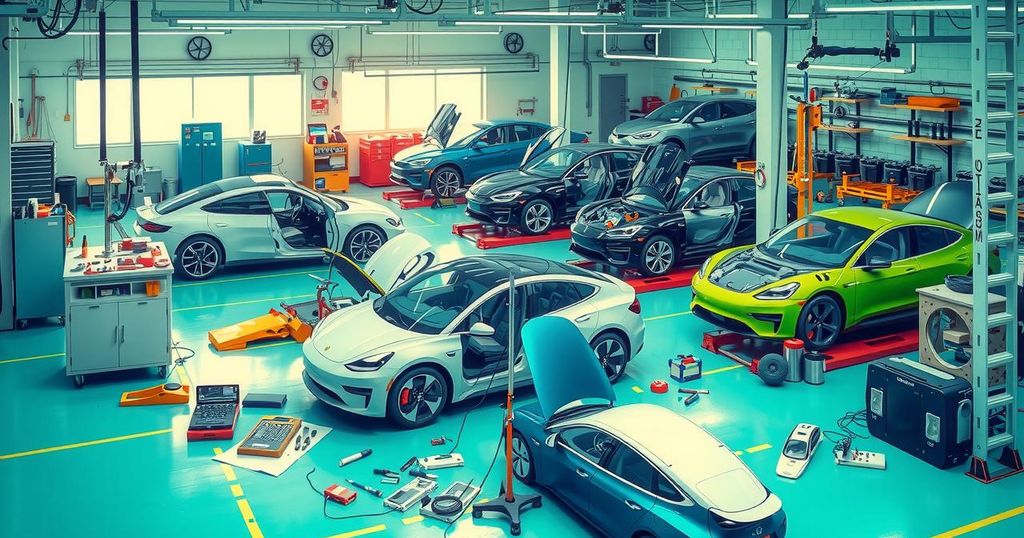Dodai: Ethiopia’s Leading Electric Vehicle Innovator and Its Growth Strategy
Dodai, founded by Japanese entrepreneur Yuma Sasaki, has become Ethiopia’s fastest-growing electric vehicle maker in under a year by selling 850 battery-powered motorcycles. The company is supported by Ethiopian Investment Holdings in establishing battery swapping stations, enhancing vehicle accessibility. It has captured significant market share among businesses, demonstrating effective strategies amid regulatory challenges and supply chain issues.
In energy-deprived Ethiopia, where less than half the population has access to electricity, the startup Dodai has made significant strides with its battery-powered motorcycles. In under a year, the company has become the fastest-growing electric vehicle manufacturer in the nation, selling 850 units despite facing regulatory and supply-chain hurdles. Dodai’s two-wheelers have gained popularity among businesses for their range of up to 150 kilometers (93 miles) on a single charge, making them ideal for delivery services.
The Ethiopian government has noted Dodai’s success, with Ethiopian Investment Holdings planning to establish 300 battery swapping stations over the next three years. This infrastructure, which allows for quick battery exchanges, aims to improve the accessibility of electric vehicles in a country where stable electricity and charging stations are rare. Warren Ondanje, managing director of Africa E-Mobility Alliance, remarked on the significance of the partnership, stating that it validates Dodai’s market presence and indicates growing governmental support for the electric mobility sector.
Founded in 2022 by Japanese entrepreneur Yuma Sasaki, Dodai has garnered interest from various businesses, such as Sheger, a wedding store in Addis Ababa, which transitioned from fossil-fueled bikes to Dodai’s electric models. Owner Kibrom Hagos reported substantial savings on fuel and maintenance, noting, “We charge the bikes at our store and give a better service to our client at no fuel cost and low maintenance cost.”
Priced at $1,800, which is approximately $500 more than competitors like Yadea and Transsion, Dodai primarily caters to small and large enterprises, including an exclusive partnership with the Ethiopian Postal Service, its largest customer. The company distinguishes itself by utilizing lithium-ion batteries, offering advantages over the lead-acid options provided by competitors.
Dodai’s growth strategy includes overcoming the often protracted motorcycle registration process, which can take up to six months. To facilitate this, Dodai has collaborated with Beatrix, a GPS provider, enabling quicker installation of tracking systems required for new vehicle registrations. This collaboration allows Dodai to subsidize costs for license plates, significantly aiding customers. Sasaki noted that the company holds a 100% market share in EV bikes with license plates due to its customer support initiatives.
Despite these strategies, several challenges persist, such as regulatory issues and supply chain disruptions that hinder shipping times for electric components. Bank financing remains a challenge, making it difficult for independent gig workers to acquire loans for purchases. The battery swapping model is anticipated to alleviate some concerns about charging and accessibility for riders by allowing quick battery exchanges at designated stations.
Experts suggest that the partnership with Ethiopian Investment Holdings will enhance Dodai’s ability to navigate regulatory complexities and may increase revenue through government contracts. This partnership also represents a strategic move, as Dodai will manage the swapping stations while Ethiopian Investment Holdings ensures a stable power supply and land, fostering an innovative payment model.
As Dodai prepares to raise an additional $10 million to support its battery swapping initiative, which will require substantial investment in technology, Sasaki remains optimistic about the dual model approach. The company plans to maintain its fixed battery option while gradually introducing battery swapping, allowing it to cater effectively to different market segments. Sasaki stated, “Our approach will remain flexible, continuously adjusting our focus between the two models based on customer preferences and market dynamics. The goal is to strike the right balance to serve both segments effectively.”
Dodai has rapidly established itself as Ethiopia’s fastest-growing electric vehicle maker by meeting the needs of businesses seeking efficient, battery-powered transport solutions. With the support of Ethiopian Investment Holdings and an innovative battery swapping model, Dodai is positioned for significant growth despite regulatory and supply chain challenges. The dual model strategy of offering both fixed batteries and battery swapping could further solidify Dodai’s market leadership in the evolving electric mobility landscape.
Original Source: restofworld.org




Post Comment